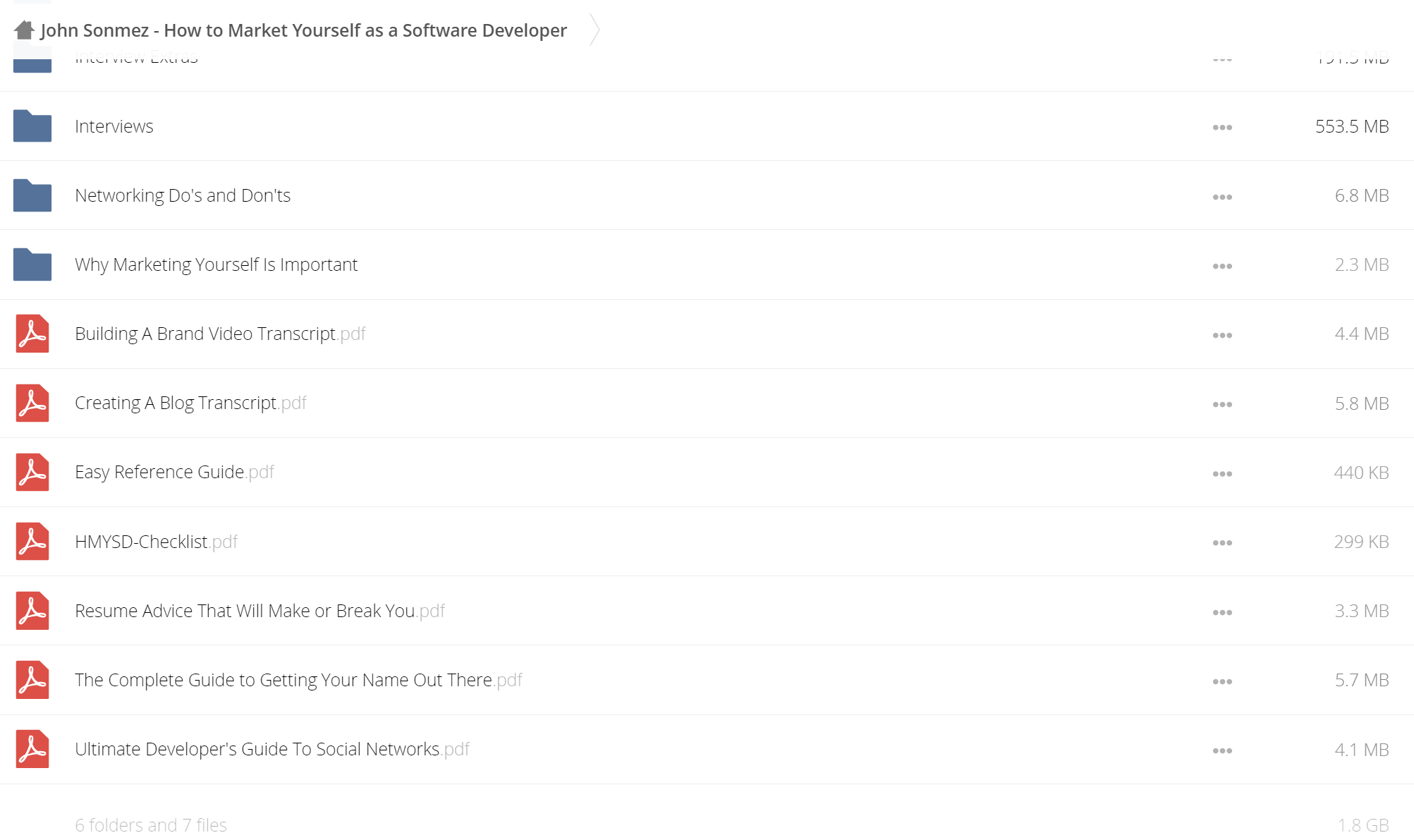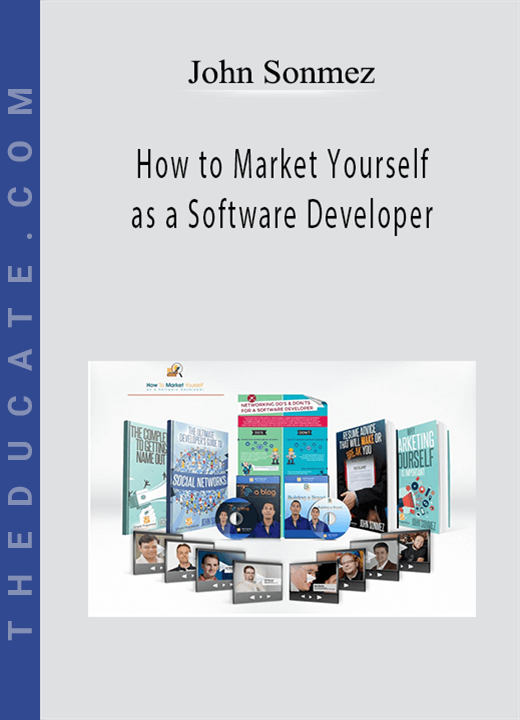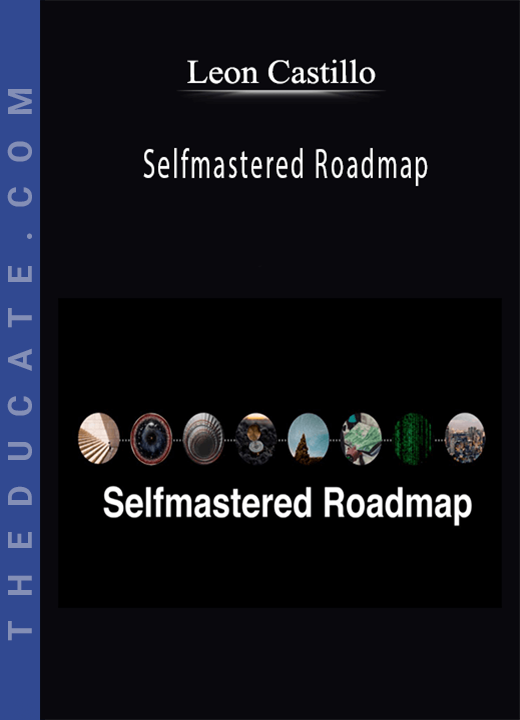Description


John Sonmez – How to Market Yourself as a Software Developer
Price : $299
Just pay : $31
Your development stack is cutting edge—for 1999…
Your coworkers laughed when they
caught you learning on your lunch break…
Your boss is only “agile“ when he’s
dodging questions about that raise he promised…
And as you wedge yet another bug fix into that
monster 10,000-line class you wonder…
Am I Trapped In This
“Code Monkey” Job
For The Rest Of My Life?
Or can you finally find work that energizes you…
Solving challenging, real-world problems…
With a team of professionals who take pride in their work…
And even get paid what you’re actually worth?
Dear Fellow Software Developer,
I still remember the moment when my boss pushed me over the edge.
One minute my boss, Tom Shirkey, is pulling me into the conference room for a little “sidebar” chat…
Next thing I know, something inside me snaps and I’m screaming into his face at the top of my lungs—while he yells right back.
And it took everything in me not to…
Punch That Micro-Managing Weenie
Right In The Face!
Now I’m not proud of this shouting match. It was definitely a low point in my software development career.
But he really did have it coming…
Tom was easily the worst part of the worst job I ever had.
Every morning when I walked through that front door my stomach clenched into knot. I counted down every second of every day, and when 5 p.m. rolled around I hit that door running…
Hi, I’m John Sonmez.
And back when Tom was making every day a living hell, I had no idea what the future had in store for me.
I didn’t know that I’d one day become a leader in the developer community thanks to Simple Programmer, my blog that reaches more than 1 million devs a year.
I didn’t know that I’d go on to create 55 PluralSight training courses on topics ranging from Java to iOS to GoLang, or write the best-selling book, Soft Skills: The Software Developer’s Life Manual.
I didn’t know that I’d someday headline at international developer conferences like Ordev and Xamarin Evolve, or have major corporations like Verizon knocking on my door to consult with me at $500 an hour.
And I really had no idea that I’d achieve my lifelong dream of early retirement—and that I’d reach that goal before my 33rd birthday.
Back then, all I knew is that…

Today my book Soft Skills is one of the best-selling software developer books of all time.
“Office Space” Wasn’t Just
A Funny Movie Anymore—
It Was A Documentary Of My Life
To be honest, I only took that job out of desperation.
I’d been out of work for 3 months.
My wife and I were living with my parents near Orlando, crashing on their sofa bed in the living room while I job hunted.
And after a few months of shotgunning out resumes and hearing nothing but deafening silence, you start to believe that…
The Deck Is Stacked Against You
Because of my role as a mentor to software developers all over the world, I hear from a lot of developers who are in the same boat I was.
Here’s the real problem:
Programming has become a commodity.
As in, a product that’s bought by the pound, usually from the lowest bidder.
The word got out years ago about all the opportunities available in software development.
It really is a great career choice…
Where else do you get the chance to spend your working hours pursuing a challenging craft, solving meaty and important real-world problems, building products that change the world, working with some of the best and brightest minds out there…
Learning and stretching every day…
Enjoying trendy office space, free snacks and break room ping-pong matches…
And making serious bank in the process?
No wonder a “gold rush” of eager young programmers flooded into the job market. And that trend continues—40,000 new computer science students enter the U.S. job market every year, and that’s not counting self-taught developers and bootcamp graduates.
Now the really great jobs are still out there.
But once you’ve been around the block a few times, you start to realize that the opportunities, salaries and perks in software development are “asymmetrical.”
What I mean by that is that…
The Top 3% of Developers
Snap Up All The Best Opportunities Before You Even Hear About Them
Which leaves you to slug it out with increasing numbers of recent graduates who happily work for peanuts to get a foot in the door.
And what makes all this even tougher is that the hiring process for software developers is completely broken.
Let me lift the curtain for you and show you just how bad it is…
When a company posts a job on a site like Monster or Dice, it’s like tossing chunks of bloody fish into water that’s teeming with Great Whites—a vicious feeding frenzy erupts.
The first application arrives within seconds. And they continue to pour in for days until the posting expires.
Companies get 250 applications for every job they post, and that’s just an industry average.
Good developer jobs can attract far more than that, as desperate job seekers (like I was!) spam their resume to every company that comes up when they search the term “developer” on Monster…
75% of the time they’re not even qualified.
Think about all that NOISE.
Now do you suppose that companies have their best developers carefully weigh every application?
Of course not. Your resume gets “screened” by low-level HR lackeys who think “for loop” is a golf term…
Yet they get final say over whether your resume makes it into a hiring managers hands… Or gets tossed on the “unqualified” slag heap.
And since the HR screeners can’t tell the programmers from the posers, they just scan for buzzwords—an average of just 6 seconds per resume.
Here’s a scary stat:
98% Of Candidates Are
Eliminated
Based On Their Resume Alone!
That means your odds of even landing an INTERVIEW are only 1 in 50.
And your odds of actually getting an offer?Just 1 in 250.
Again, that’s an AVERAGE.
Want to work at Google? Good luck—it’s 10X harder to get a job there than to get into Harvard.
Could things get worse soon?
Just about every week there’s word of another round of mass layoffs at major tech giants like Microsoft, Yahoo, and IBM.
And according to Business Insider…
Industry Leaders Expect The Recent “Tech Bubble” To Burst At Any Time
Why isn’t anyone telling developers about this new reality?
It’s the reason why I spent months sleeping on my parents’ couch, applying for job after job, never getting so much as a polite rejection notice in return…
And it’s why I agreed to interview with the consulting firm in New Jersey where I met Tom.
That dysfunctional crew seemed determined to make me miserable from the first minute. They forced me to wear a full suit and tie to the interview—which happened over lunch in a Chinese restaurant.
The whole time they’re chowing down on egg rolls, and they didn’t ask me a single technical question.
(Later I realized that they didn’t really care if I could program—they were hiring me to be a fall guy. More on that in a minute.)
And as I’m fielding their softball questions, I’m thinking, “I do not want this job, I do not want this job…”
So Of Course I Get The Job
And the hourly rate was too good for a down-and-out developer like me to pass up. After all my family was counting on me to put a roof over our heads again.
So we packed everything we owned into our Xterra and headed up the coast to New Jersey—and thus began the longest 11 months of my software development career.
Day 1: Welcome to Hell, We Have T-Shirts
My new boss Tom was an ex-high-school football coach with a bushy brown mustache—the stereotypical overbearing step-dad.
He was there to make you run your plays like a good linebacker, and if you didn’t, Tom was going to make you do wind sprints until you dropped dead of exhaustion.
Tom had juuuuuuuust enough Visual Basic under his belt to make him a certified expert on every aspect of software development.
Tom had to review all of my code before I checked it in—even though he didn’t know a vector from his… Well, anyway…
Tom had to give his blessing before I could install any new tools on my dev box—and man did he ever pitch a fit when I installed the .NET framework without running it by him first.
Later I’d discover that Tom even wanted control over what I did when I WASN’T under his paternal eye…
Anyway, my first day on the job I hadn’t quite figured all this out yet. Tom starts explaining my assignment to me, and I could hardly believe what I was hearing.
And I started to realize that…
This Whole Gig Was A Setup From The Start—They Expected Me To Fail
Their little racket went like this:
Take on a filthy lucrative consulting project with a humanly impossible set of requirements.
Then hire the first hourly consultant who wanders in off the street as your fall guy.
And when he fails, you just fire him.
You and your good ol’ boy FTEs escape scot free, and you’re laughing all the way to the bank.
Tom didn’t clue me in on that though.
Instead he gave me some files in this proprietary printer format from Xerox called Metacode.
My job was to rip apart these chunky binary files, pour through megabyte after megabyte of raw hexadecimal code, and find a way to yank out fonts and images—WITHOUT access to the source files, or any documentation on Metacode itself.
Good luck, son!
I Can Read The Matrix
The first time I cracked one of those Metacode files open in UltraEdit, I felt sick. Pure hexidecimal gibberish.
But after a few minutes of feeling sorry for myself, my QA training came back to me…
In college I’d worked for HP as a tester for their printer drivers. My job there consisted of studying reams of printouts and looking for patterns, so that’s exactly what I did.
And eventually I noticed something:
The pattern “1A 1B,” repeated over and over. A header!
I’d found a crack in the fortress wall, and 2 weeks later I had written the world’s first Metacode decompiler.
Now after this you’d think that Tom and the gang would finally start to give me some respect.
Instead, they accused me of CHEATING.
I had to walk them through full demo. “See, now I’m extracting a font file. Look ma, no hands!”
“Well Crap, If We Can’t Fire Him,
Maybe We Can Make Him Quit“
Looking back I realize that I’d put them in a tight spot, because they never planned on me sticking around.
But since I’d just pulled off this “Metacode miracle” (which was worth millions to the company) they couldn’t exactly fire me either.
So Tom took every chance he could to crank the screws tighter and tighter…
Like the tongue-lashing I took the time I finished a project early and decided to add a couple of “nice to have” features that I knew the users would really appreciate.
And the grueling all-day trips to customer sites on Long Island to babysit installers and swap out CDs.
Tom was trying to grind me down.
Instead he lit a fire under my ass, and…
I Was Determined To Be The Best C++ Programmer In The Country
I spent every “spare” minute studying.
I learned everything there was to know about pointers and vectors and memory management. I mastered advanced algorithms. I even built my own app—a life counter for Magic the Gathering.
When the smoke cleared, I was one of the best-ranked C++ developers in the world on Top Coder.
My confidence in my skills was soaring.
But every day at work, Tom would kick my teeth in and remind me who was boss.
Finally They Pushed Me Too Far
One day Tim announces that the entire team is taking a MANDATORY week-long trip to Manchester, England for training.
Now I’m the only contractor in the group—everyone else is on salary. I get paid by the hour. And all that time I’d be spending in jolly old England was time away from my family and my all-important side projects.
So I pull Tom aside. “Are you planning to pay me for 24 hours a day on this trip?” I ask.
Tom laughs. “No, you’re getting a free trip to London,” he says.
You’re gonna go, and you’re gonna like it, sonny.
And that’s when I snapped. Before I knew it, Tom and I were belly-to-belly like a couple of trash-talking linebackers after a nasty play.
I was out of line, and as a contractor, I had NO leverage in the situation, but I was DONE being pushed around.
There was no way I was getting on that plane.
Oh Goodie, Now We Can Fire Him
I sat in the empty office for the next 7 days, all by myself under the under the humming florescent lights.
Everyone knew my days were numbered. They let a couple of weeks go by to save face, and then the ax fell.
And even though I had zero job prospects, I was SO relieved.
We jumped in the car and arrived at my parents’ house at 2:30 the next morning.
“Surprise, Dad! I’m Back!”
This time I KNEW things would be different.
Thanks to my daily Top Coder bench pressing, my C++ muscles were bulging. Good luck stumping me in a tech interview.
And I’d racked up a list of accomplishments that would impress the socks off any hiring manager out there.
So I jumped back into the now-familiar routine of surfing Monster and Dice for job openings, typing up cover letters, emailing out my resume, submitting online forms…
And let me tell you, I was stunned when I hit that same stony silence.
No acknowledgement of my applications.
No replies to my follow up calls and emails.
No rejection notices.
You Start to Wonder,
Am I “Hell Banned”?
Meanwhile the clock is ticking, and I’m getting desperate again.
Somehow I finagled my way into interviews for 2 different positions at HP.
I packed my suit, and they flew me out, and I completely ACED both interviews.
So imagine my shock when the rejection letters arrived!
This was like a bucket of ice water in the face—a rude awakening.
That’s when I first realized that:
The Best Jobs Rarely
Go to the Most Talented,
Knowledgeable Developer
For the first time I saw that when it comes to landing a great job, your technical skills won’t take you all that far.
This discovery turned my world upside down.
Here I had invested months of my life studying and hustling on side projects…
And in the end it didn’t count for much.
The game really was rigged.
Even my “interviews” at HP were a complete sham.
HP is a good ol’ boy’s club, and I was just a “token” external candidate.
They were wasting my time and getting my hopes up when really I had NO chance.
The same goes at most companies.
There’s a “shadow job market” that’s invisible to outsiders.
Because according to the U.S. Department of Labor…
85% of Jobs Are Never Advertised
If You See a Job Advertised,
You Don’t Actually Want It
After getting my fingers slammed in the door, I decided to see if I couldn’t make this “shadow job market” work to my advantage.
So I looked up a former boss, the guy who hired me at HP the first time.
He was still there, and as it turned out, he was looking for a QA lead.
I accepted his offer—at a pride-busting rate of $35 an hour.
I finally had a job again, but I was still pretty discouraged, because…
In Just 4 Short Years, I’d Gone from Teenage “Boy Wonder”
Pulling Down $75 an Hour
in California…
To Getting My Head Bashed In
For $45 An Hour…
And Even As One of the Top
C++ Developers In The Country…
I’m Forced To Take A Job In QA That Pays 1/3 What I’m “Worth”
It made NO sense at all.
Why didn’t anyone seem to value my my coding skills?
But I was finally starting to catch on, because I understood…
You Need an “In” to Get the Job
Well, that crappy QA job was my “in,” and I swore to myself I’d be writing software again soon.
One day I overheard a developer named Brian talking about a problem he was struggling with. Brian was a new developer, and he was way in over his head.
So I popped over to his cube and we thrashed out a solution.
Before long I was a “stealth member” of the dev team, and a trusted mentor and adviser.
Finally they went to their boss and said, “You have to hire John. We can’t hit our deadlines without him.”
I had discovered the principle that would come to define my career:
The Way to Create Real, Life-Changing Opportunities For Yourself Is To First Give Value to OTHERS
The most successful people in any walk of life are successful because they’ve created massive value for others.
Take a “famous” software developer like Robert “Uncle Bob” Martin, for example.
Uncle Bob built his reputation by sharing his wisdom on UseNet, and now he’s one of the most trusted and talked-about experts in the field.
What kind of consulting fees do you think Uncle Bob can command these days?
Or look at Scott Hanselman, who has built a massive following by teaching everything he learns on his blog, podcast and conference presentations.
If Scott decided tomorrow that he was done at Microsoft, how long do you think it would take him to find a new job?
In every job I’ve made it my aim to add more and more value above and beyond “just” code.
When I took a contract with the Idaho state government, I made it my mission to help every member of my team become a more productive, more fulfilled developer, and started Simple Programmer as a way to share what I was learning with my team.
Word spread about my blog, and soon thousands of people were reading every month.
These developers started to look to me as a leader, someone whose voice and opinion deserved RESPECT.
As a result, I got promoted to project lead—at the highest hourly rate of any contractor in Idaho state history.
Then one day I got another lesson:
When You Become A Recognized Authority, Opportunities Chase YOU
I was sitting at my desk when my phone rang. It was a hiring manager from a multimedia software company.”
Hey John, we all read your blog and love it. We have a position opening up, and we’d like to hire you for it.”
I wasn’t really looking for a job, but cool. What’s a good time for me to interview?
“Interview? No, you don’t understand. We don’t want you to apply—we just want to hire you. The job is yours if you want it.”
That floored me. What a turnaround!
Just a few years ago I couldn’t get employers to so much as look at my resume if I begged them to…
And I’d get edged out even when I ACED the technical interview…
And now I was getting “walk on” job offers!
When you focus on always giving value, you’re making “deposits in the emotional bank account,” as Dale Carnegie wrote.
When you do this, before long people look to you as an expert, authority and even a leader…
And you start attracting opportunities without even trying.
Unexpected job offers.
Lucrative freelancing and consulting gigs.
Speaking invitations.
Book deals.
Business partnerships.
This is the real secret to landing the BEST software development jobs and opportunities—you know, the “mythical unicorn” jobs you sometimes hear about…
Where you’re working with a team that’s as passionate about learning as you are…
Building software that solves REAL and interesting problems…
Where you’re challenged to grow and develop your technical skills…
And where the pay and job perks are TOP TIER.
When You’re A Known And Respected Authority, The Old “Rule Book” Goes Out The Window
After that surprising job offer, the opportunities started coming fast and furious.
And when you have more opportunities than you can say yes to, that means you have OPTIONS.
You’re in the drivers seat, and that gives you a tremendous feeling of security and confidence.
Do you know how great it is to know that you can stroll into your boss’s office and say, “I quit!”
Because you KNOW beyond a shadow of a doubt that you could send a couple of emails and walk into a new job tomorrow morning?
When you have options like this, interviews aren’t scary anymore. You radiate confidence, because you don’t need them, they need YOU.
In short…
Instead Of Chasing “The Prize,” You ARE The Prize
Here are just a few things that happened to me over the next several years:
- A startup contacted me about building a testing framework for them. I didn’t really want the work, so I quoted what I thought was a crazy high hourly rate of $300 an hour. Their reply: “When can you start?” I’ve since raised my consulting rate to $500 an hour, and I turn away requests regularly.
-
-
- I got invited to audition as an online trainer with a little startup called PluralSight. They liked my audition, and I spent two years cranking out 55 courses. The royalties on these courses enabled me to “retire” as a millionaire at 32.
-
- All This, And I’m Still Pretty Much the Same Guy Who Couldn’t Get Companies to Even LOOK at My ResumeDon’t get me wrong, I kept studying and learning new programming languages and platforms and architecture patterns.
But my career stayed stuck in neutral until I made a shift from always trying to be the “rockstar” coder with the hottest technical skills…
And focused my attention on giving value in ways that really matched what employers wanted and needed.
As I shared that value with as many people as I could, they came to respect me as an authority…
And they’d seek me out so that I could help them even more.
There’s A Term For This—And It’s A “Dirty Word” To A Lot Of Developers
But we’re all adults here, and I know you can handle it.
Ready?
It’s called:
“Marketing.”
Ahhhh! Marketing?!?
I get that reaction every time I bring this up.
Let’s be perfectly clear about something here:
There is a LOT of nasty stuff that goes on under the banner of “marketing.”
You don’t want to be associated with any of that, and neither do I.
But don’t let those scammy tactics blind you to the underlying truth that…
“Marketing” Just Means Connecting A Person With A Problem To A Person With A Solution
Marketing is fundamentally about helping people solve problems.
And isn’t that what we excel at as software developers?
When you “market yourself” the way I’ll show you, by always looking to give deliver overwhelming value, it feels completely natural.
In fact it’s even satisfying.
And let me tell you, it’s so much better than putting yourself through the degrading meat grinder of the job hunt process.
Now I fell into all of this entirely by accident.
Each of the principles I’ve shared with you here… these ideas that have propelled me to successes I never thought possible…
Took me YEARS of trial and error to uncover.
If someone had taken me aside when I was a brand new developer at 19, and walked me step by step through what I know today…
It would easily have saved me a decade of struggle, frustration and rejection…
And instead of feeling trapped and stuck, and wondering why no one seemed to recognize what a talented and hard-working developer I was…
I’d have had a clear plan for building exactly t






7 reviews for John Sonmez – How to Market Yourself as a Software Developer
There are no reviews yet.